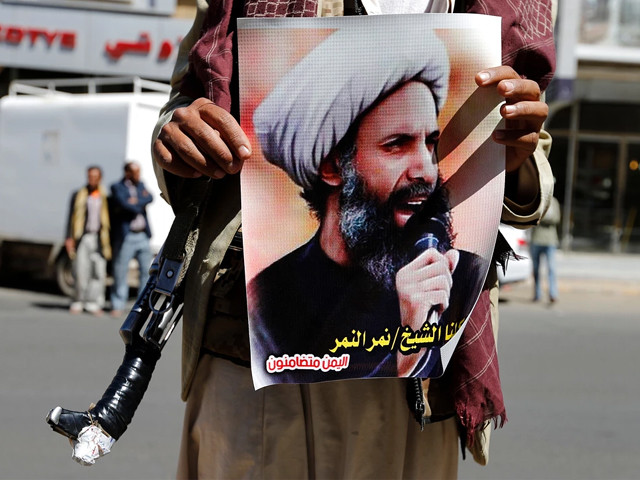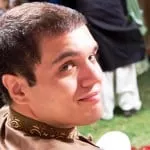His name was Sheikh Nimr al-Nimr, and his reformist voice threatened the very foundation of a family business disguised as an Islamic Kingdom.
In 2008, The Guardian described him “as the most popular Saudi Shia cleric among local youth”.
Following his arrests, thousands flooded the streets in Saudi Arabia, in what was an unprecedented event for the country.
On the surface, his means were reportedly peaceful. In 2011, he told the BBC he preferred “the roar of the word against authorities rather than weapons... the weapon of the word is stronger than bullets, because authorities will profit from a battle of weapons”.
In 2012, the cleric was arrested yet again for taking part in demonstrations against the Saudi Kingdom. Here, as before, he is said to have suffered from torture.
In 2014, he was sentenced to death, resulting in national and international outrage.
Al-Nimr stood with Shias who faced persecution at the hands of the Saudi regime. He also openly criticised the Kingdom’s allegedly violent meddling in the predominantly Shia neighbouring nation of Bahrain. But perhaps the kicker for the Saudis was his stance in favour of democracy, and his call for elections. Elections are, of course, Saudi Arabia’s kryptonite:
The Guardian,
“Nimr had long been regarded as the most vocal Shia leader in the eastern Saudi province of Qatif, willing to publicly criticise the ruling al-Saud family and call for elections.”
Wikileaks,
“Arguing that he is portrayed publicly as much more radical than the true content of his words and beliefs, the Sheikh also espoused other conciliatory ideas such as fair political decision-making over identity-based politics, the positive impact of elections, and strong ‘American ideals’ such as liberty and justice. Despite this more moderate tone, al-Nimr reasserted his ardent opposition to what he described as the authoritarianism of the reactionary al-Saud regime, stating he would always support ‘the people’ in any conflict with the government.”
We can all agree that by its very structure, a monarchy is un-Islamic. The Prophet Muhammad (PBUH) is said to have commanded Muslims to choose their leader in a democratic process rather than a dynasty, and the Prophet’s (PBUH) grandson, Imam Hussain (AS), died fighting against a ruler who had defied this teaching in one of the most pivotal moments in Islamic history.
Here was al-Nimr, a rising cleric, rabidly popular among the youth and standing for non-violent demonstrations in favour of elections. Democracy is a very Islamic ideal, yet for the so-called gatekeepers of Islam, to follow this teaching would mean losing their grip on a profitable enterprise.
As anyone who has seen The Godfather knows – a powerful family business will put out a hit on those who threaten their way of life. In this case, the hit-men were members of the Saudi justice system.
Said Boumedouha, Deputy Director of Amnesty International’s Middle East and North Africa Programme,
“The death sentence against Sheikh Nimr Baqir al-Nimr is part of a campaign by the authorities in Saudi Arabia to crush all dissent, including those defending the rights of the Kingdom’s Shi’a Muslim community.”
As Boumedouha explains, the Saudis wanted him out of the way, by any means necessary.
“Sheikh al-Nimr’s trial has been seriously flawed. Eyewitnesses, whose testimonies were the only evidence used against him, were not brought to court to testify. This violates the country’s own laws. The Sheikh was denied the most basic means to prepare for his defence and was not represented by legal counsel for some of the proceedings because the authorities did not inform his lawyer of some dates of the hearings.”
History will decide whether al-Nimr was a true freedom fighter, but the role of the villains of this tale is without doubt.
I leave you with the partial transcript of a speech delivered by the late cleric.
“For the past 100 years, we have been subjected to oppression, injustice, fear, and intimidation. From the moment you are born, you are surrounded by fear, intimidation, persecution, and abuse. We were born into an atmosphere of intimidation. We feared even the walls. Who among us is not familiar with the intimidation and injustice to which we have been subjected in this country?
I am 55-years-old, more than half a century. From the day I was born and to this day, I’ve never felt safe or secure in this country. You are always being accused of something. You are always under threat. The head of the State Security Service admitted this to me in person. He said to me when I was arrested, ‘All you Shiites should be killed’.
That is their logic. The head of the State Security Service in the eastern province said so himself.
They are still plotting to carry out a massacre. They are more than welcome. We are here. Our blood is a small price to pay in defence of our values. We do not fear death. We long for martyrdom.
A few months ago, the flame of honour was sparked in the spirits of the youth. The torch of freedom was lit. The people took to the streets demanding reform, honour, and freedom. There are people who have been held in prison unjustly for more than 16 years. In addition, the Peninsula Shield Force and the Saudi army invaded Bahrain.
Then, there were more and more arrests. So who was it who instigated strife and unrest?
The strife and unrest in Awwamiya were instigated by the regime, not the people. We will continue to defend the veteran and the new prisoners. We will stand by them. We don’t mind being arrested and joining them. We don’t even mind shedding our blood for their sake. We will continue to express even stronger solidarity with Bahrain. It is our own kin in Bahrain. Even if the Saudi army and the Peninsula Shield Force had not intervened, it still would have been our duty to stand by the people of Bahrain, our kin. Let alone, when the Saudi army takes part in the oppression, the killing, the violation of women’s honour, the plundering of money.
(The Saudi regime says) that we are acting at the ‘behest of a foreign country’. They use that as a false pretext. By ‘foreign country’ they mean Iran, of course. You can’t really tell if it’s Iran, Turkey, a European nation, or the US… but they usually mean Iran. In December 1978, there was an Intifada to defend the honour of the Awwamiya, when the riot police attacked the town. This was on December 10, 1978, before the Shah was deposed, before the Islamic Republic of Iran was even established. It was in 1978 – four months before the fall of the Shah.
A group of people convened to perform the religious rite of taziyeh for Imam Hussain (AS). It had nothing to do with political or security matters, but the security forces arrived and attacked them, and a confrontation ensued. People were defending themselves as well as their faith and honour.
That night, they arrested a hundred people. This was prior to the fall of the Iranian Shah. So how can they talk about foreign interference?
You should be ashamed of yourselves. Iran has been developing its military capabilities. If you are worth your salt, develop capabilities of your own, instead of talking. Iran is doing actual work. It has a military industry and is making progress. Instead of talking about ‘a behest of a foreign nation’, go ahead and sever your relations with Iran.
You keep talking about a ‘foreign nation’. I dare you to name that nation. Do you not dare to even mention its name?
At the end (the Saudi statement) read: ‘We will use an iron fist’.
Go ahead and use your ‘iron fist’ against that ‘foreign nation’. Why are you using it against us, against 40 or 50 wretched people? If such a ‘foreign nation’ exists, attack the head of the serpent. If you mean Iran, go ahead and attack Iran, or any other country. Let’s see your ‘iron fist’. It will turn out to be a cardboard fist in the face of that ‘foreign nation’.
We have no ties with Iran or any other nation. We are connected to our values and we shall defend them, even if your media continues with its distortions.
The Peninsula Shield Force and Saudi army are mired in the quagmire of Bahrain. They are finding it difficult to leave. They are entangled there. They haven’t accomplished their goals and they cannot leave. They are stuck in a quagmire, and they will find themselves stuck in a worse quagmire. If they come here they will find themselves in a worse quagmire, because we are in Saudi Arabia.
Not by violence, but by our determination, by our belief and by our steadfastness, shall your power be defeated.
We have the determination to resist your injustice, and we will not surrender. The most you can do is kill us and we welcome martyrdom for the sake of Allah. Life does not end when a man dies. Real life begins when he dies. Either we live on this land as free men, or die and be buried as pious men. We have no other choice.
We submit to the authority of Allah, his messenger (PBUH), and his family, and that’s it. We do not submit to the authority of a ruler. Never. No ruler, whoever he may be, has authority over us. (Political) power does not grant a ruler legitimate authority. The legitimacy of authority emanates from Allah.
Authority is bestowed by Allah, and he does not bestow it upon the unjust. We are not loyal to other countries or authorities, nor are we loyal to this country. What is this country? The regime that oppresses me? The regime that steals my money, sheds my blood, and violates my honour?
What does a country mean? The regime? The ruling clan? The soil?
I don’t know what a country means. Loyalty is only to Allah! We have declared, and we reiterate, our loyalty is to Allah, not to the Saud clan. Our loyalty is to Allah, not this country. Our loyalty is to Allah and to those whom Allah grants authority. That’s it.”
[/fblink]



COMMENTS
Comments are moderated and generally will be posted if they are on-topic and not abusive.
For more information, please see our Comments FAQ